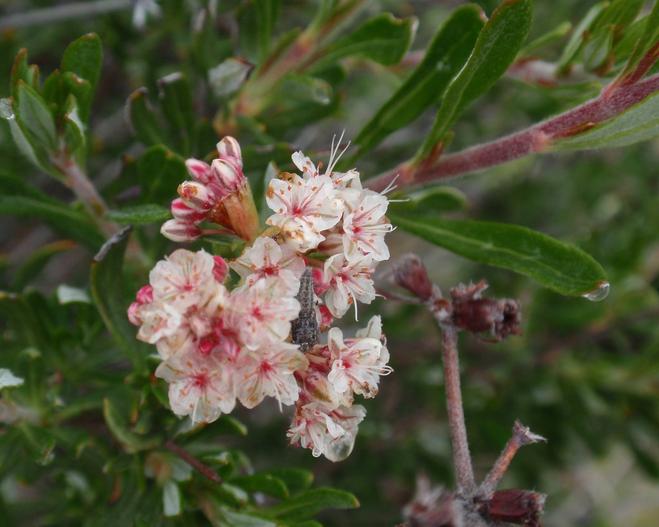California Buckwheat
(Eriogonum fasciculatum var. foliolosum)
California Buckwheat (Eriogonum fasciculatum var. foliolosum)
/
/

Tom Hilton
CC BY 2.0
Image By:
Tom Hilton
Recorded By:
Copyright:
CC BY 2.0
Copyright Notice:
Photo by: Tom Hilton | License Type: CC BY 2.0 | License URL: https://creativecommons.org/licenses/by/2.0/ | Uploader: Tom Hilton | Publisher: Flickr





Estimated Native Range
Summary
Eriogonum fasciculatum var. foliolosum, commonly known as California Buckwheat, is a perennial shrub native to the chaparral and coastal sage scrub regions of California and the southwestern United States. It typically grows up to 3 feet tall and wide, with a rounded, spreading form. This species is well-adapted to its native arid environments, thriving on well-drained soils and requiring minimal water once established. The shrub produces dense clusters of small flowers that transition from white to pink as they mature, blooming from late spring through summer and attracting a variety of pollinators, including bees and butterflies.
California Buckwheat is highly valued for its drought tolerance and low maintenance, making it an excellent choice for xeriscaping and native plant gardens. It is also used for erosion control on slopes and in restoration projects. The plant’s ability to thrive in poor soils and its resilience to heat and drought contribute to its popularity in sustainable landscaping. While it is generally disease-free, overwatering can lead to root rot. It is important to note that California Buckwheat can become quite woody with age, and periodic pruning can help maintain a more compact and attractive form.CC BY-SA 4.0
California Buckwheat is highly valued for its drought tolerance and low maintenance, making it an excellent choice for xeriscaping and native plant gardens. It is also used for erosion control on slopes and in restoration projects. The plant’s ability to thrive in poor soils and its resilience to heat and drought contribute to its popularity in sustainable landscaping. While it is generally disease-free, overwatering can lead to root rot. It is important to note that California Buckwheat can become quite woody with age, and periodic pruning can help maintain a more compact and attractive form.CC BY-SA 4.0
Plant Description
- Plant Type: Shrub
- Height: 1.5-2 feet
- Width: 2-3 feet
- Growth Rate: Moderate
- Flower Color: Pink, White
- Flowering Season: Spring, Summer, Fall
- Leaf Retention: Deciduous
Growth Requirements
- Sun: Full Sun
- Water: Low
- Drainage: Medium, Fast
Common Uses
Bee Garden, Bird Garden, Butterfly Garden, Deer Resistant, Drought Tolerant, Groundcover, Low Maintenance, Rabbit Resistant, Street Planting
Natural Habitat
Native to chaparral and coastal sage scrub regions of California and the southwestern United States
Other Names
Common Names: Eastern Mojave Buckwheat, Mojave Desert Buckwheat
Scientific Names: , Eriogonum fasciculatum var. foliolosum, Eriogonum fasciculatum subsp. foliolosum, Eriogonum fasciculatum subsp. foliosum, Eriogonum fasciculatum var. foliolosum, Eriogonum fasciculatum var. obtusiflorum, Eriogonum rosmarinifolium var. foliolosum,
GBIF Accepted Name: